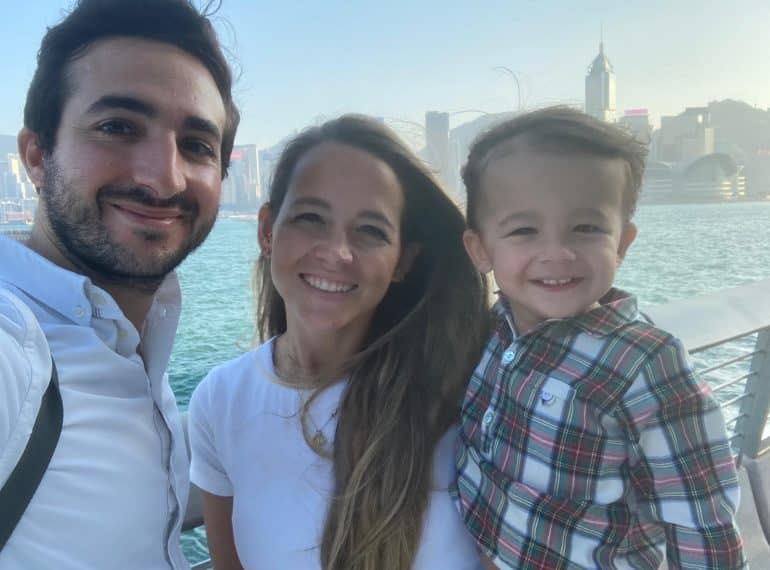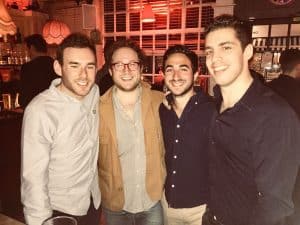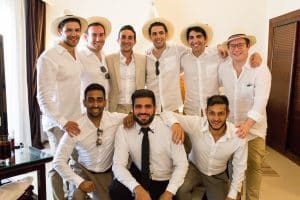
In retrospect, Jamie Wolfson’s move to a different company and a new sector could hardly have come at a more difficult time.
With the coronavirus pandemic raging worldwide, he found himself having to get to grips with his new job entirely online, liaising from Hong Kong across international time zones with colleagues he had never met.
“I joined in March in the midst of Covid, working from home – and Hong Kong apartments are very small; ours is 650 sq ft – and we had a two-year-old baby, too. The first three or four months were challenging, to say the least.
“I had to be quite resilient during that period, as most people did. The last three or four months have been more enjoyable. We are back in the office.”
 Jamie (OE 1999–2006) had moved from Ernst & Young to global insurance provider Chubb, with a role as IFRS17 Project Lead for Chubb Life, a life insurer with operations in 23 countries. IFRS17 is, he explains, an international financial reporting standard that needs to be implemented by 2023, predominantly by larger insurers, representing quite a major change for them. “I am working mainly with the global Chief Financial Officer, and also the Chief Information Officer.”
Jamie (OE 1999–2006) had moved from Ernst & Young to global insurance provider Chubb, with a role as IFRS17 Project Lead for Chubb Life, a life insurer with operations in 23 countries. IFRS17 is, he explains, an international financial reporting standard that needs to be implemented by 2023, predominantly by larger insurers, representing quite a major change for them. “I am working mainly with the global Chief Financial Officer, and also the Chief Information Officer.”
“Before I took this role, my background was more digital transformation, across the insurance value chain working with the c-suite [executive-level managers within a company, such as the CEO, CFO etc].
“I had been at EY for my whole career. Having been a graduate entering one of the Big Four, when it came to my ninth year, I felt like I was in a bit of a bubble. I just thought I needed a fresh challenge – I was in my comfort zone. I also wanted to build up some more insurance-specific experience, and had previously worked with Chubb as a client.
“You have always got to challenge yourself, because then you will keep learning, and there are already things I have learned here. In this day and age, no one can afford to stop trying to push themselves and ‘upskill’ themselves because the environment keeps changing so quickly. It’s important to push yourself out of your comfort zone.”
He adds that with his senior-level contacts at EY, returning there in the future remains a possibility, if he wishes.
Jamie met his wife, Maria, when they were both on the EY graduate scheme in August 2011. “We worked together for three-and-a-half years in London and then in Hong Kong. We moved in January 2015, and the time has flown by. I cannot really understand where the last six years have gone.
“We are very happy here. We don’t have plans to leave anytime soon,” he says, adding that after seven years, they will have the right to permanent residence, meaning they could live and work in Hong Kong without needing a work visa.
He plays 11-a-side football with the Hong Kong Football Club, which involves Tuesday night training and games on Sundays, and contributes to a lively social life. Jamie is trying to get back into tennis and also plays golf, although access to the latter in Hong Kong is difficult.
He has, of course, reflected on the implications of the democracy protests in Hong Kong. These were at their peak for a few months last year.
“Although I was never caught up in it, there were a lot of protests and occasions when the police fired tear gas; it was a strange period to say the least. How the western media portrayed it made it appear worse than it was though – picking up videos of extreme cases. For a lot of people here, I don’t think our lives have been impacted too much. On the odd occasion, we had to work from home.
“One rally last year got over 1m people [but] since May or June this year, with the new national security law, the protests have completely gone, completely subsided. It’s really quelled any dissidence to the government, to be honest, rightly or wrongly.”
There is also the commercial aspect of relations with mainland China to be considered. “In the life insurance industry, we are talking about how we do more business with China. Chubb has a joint venture there and recently took a larger stake. People are not under any illusion: China will become a key headline to profitability, so people are embracing that fact.”
But Jamie says that he does, of course, talk about “basic rights” with his friends and says that if he saw his “day-to-day life changing for the worse”, he would then consider if he had a future in Hong Kong.
 Jamie maintains strong friendships with people from his year group, including Anand Dattani, Nick Wallis, Sam Murray, Sam Granger, Dominic St George, Kumar Hindocha and Neil Yogananther. His first cousin, Mark Wolfson, is also an Elizabethan who lives in Hong Kong. “My closest friends are still my mates from the School. They all came to my wedding.
Jamie maintains strong friendships with people from his year group, including Anand Dattani, Nick Wallis, Sam Murray, Sam Granger, Dominic St George, Kumar Hindocha and Neil Yogananther. His first cousin, Mark Wolfson, is also an Elizabethan who lives in Hong Kong. “My closest friends are still my mates from the School. They all came to my wedding.
“I have really happy memories of School and I look back at it very fondly.” He especially enjoyed the Sixth Form, relishing the opportunities to spend his days studying subjects he had chosen and the fact that “the teachers didn’t treat us like kids anymore – because we weren’t”.
Among the happy memories are Geography field trips to Swanage in Dorset and “the 18-hour coach trip” to the town of Mende in Languedoc, France.
Jamie, who went on to read Geography at Nottingham, follows Headmaster Neil Enright on LinkedIn, who, he says, taught him Geography for two or three years. “It’s made me quite happy to see how he has risen in the School, but also it’s pleasing to see how well the School has done even since I left: it fills me with a lot of pride.”
Circumstances permitting, he hopes his young son, Isaac, will in a few years’ time follow in his footsteps and become an Elizabethan himself.
And does Jamie have any advice for younger Elizabethans entering their careers? “When I started at EY, I was convinced I wanted to stay and become a Partner and have some sort of global leadership role.
“I am still very ambitious, but I think my priorities, what makes me happy, have changed. They are now more focused on doing something I enjoy and am passionate about and that allows me to spend time with the family and doing sport. Money and titles – for me, that’s not what is important.
He adds: “If you can find a passion, it’s less like work, and you put in more time and more effort, which will likely be more successful. Looking back myself, I think the key is about finding that passion – and you may have do a few different things first before you find it.”
